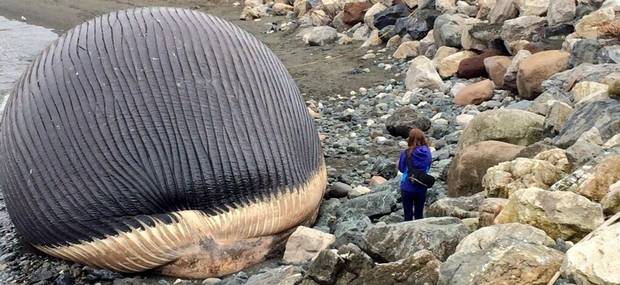 La carcassa di una balena minaccia un paesino canadese del New Foundland, Trout River, 600 abitanti. La balena piena di gas pesa 60 tonnellate. Può esplodere da un momento all’altro.
La carcassa di una balena minaccia un paesino canadese del New Foundland, Trout River, 600 abitanti. La balena piena di gas pesa 60 tonnellate. Può esplodere da un momento all’altro.
L’articolo dell’Independent del 3.5.14:
How do you deal with 60 tons of putrefying whale flesh left rotting and stinking on the normally picturesque seafront where you live? The answer, if you inhabit the small Canadian town of Trout River in Newfoundland, is very carefully.
“As the whale decomposes it releases gases such as methane and ammonia that build-up inside the body cavities. There’s a real risk of an explosion, partly as a result of the build-up of pressure and also because these gases are flammable,” said Paul Jepson, a cetacean biologist at the Institute of Zoology in London.
“When we’ve dealt with the decomposing carcasses of large whales stranded in Britain we first try to decompress the animal by sliding a knife into it. It’s amazing the pressures that can build-up inside it and it’s a great relief once this stage is complete,” Dr Jepson said.
In the past month alone, the carcasses of three blue whales, which are the largest animals in the world, have been washed up on the western shores of Newfoundland, and two local towns now face the grizzly task of safe disposal.
The blue whale carcass left on the seafront of Trout River has become massively distended with putrefying gases, rather like a grounded Zeppelin airship, causing fears that it could suddenly blow up.
“I’m not sure with the heat and gases that are trapped inside of this mammal if at some point in time it will explode,” Emily Butler, the town clerk, told the local newspaper The Star.
Bacterial decomposition and autolysis – the self-destruction of the whale tissue – releases noxious gases such as methane and hydrogen sulphide, which if they cannot escape can quickly cause a build-up of pressure, with the whale blubber acting like the stretched skin of an inflated balloon.
The preferred option in dealing with large whale carcasses that have washed ashore in Britain is to bury them on the same beach where they landed, or, if this is not possible, to cart them away to a nearby landfill, Dr Jepson said.
“Local landfill managers love them because they quickly decompose and help in the decomposition of all the other stuff in the landfill,” he said.
Towing out to sea is another possibility, but this runs the risk of the carcass becoming a shipping hazard or being blown back on land again.
The “nuclear” option is to blow the carcass up with dynamite, which was famously done with a large whale stranded off Oregon in 1970 with mixed results – tons of blubber were scattered over a wide area with one large fragment flattening a nearby parked car.

